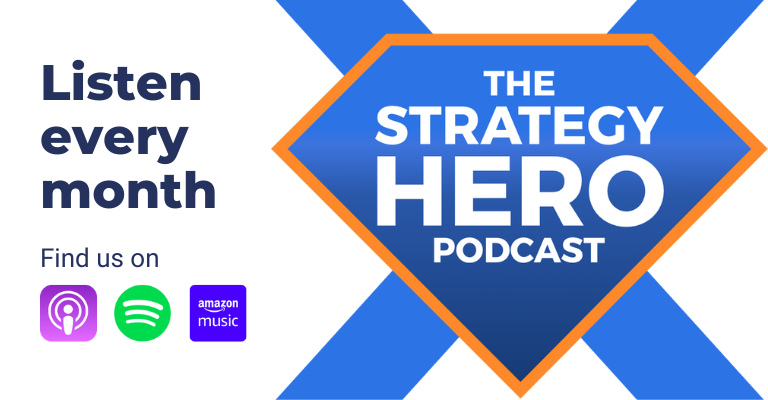What do empathy, active listening, trust, credibility, and continuous learning have to do with strategy execution? Here's what I learned from season two, episode seven of Strategy Hero with Jack Soos.
When we talk about the strategy-to-execution gap, there's a lot of theory and not so much substance. Often, those in leadership roles complete their MBA and head straight to the top, skipping the most vital starting point - the bottom.
Jack Soos, Senior Director of Global Realty Services at RTX, has a career that has taken him through levels and industries, but along the way, he's found what he feels are crucial tools that can bridge operational and transformative work.
Here's what I learned from my time with Jack.
It’s important to note that my opinions do not reflect those of i-nexus, Jack Soos, and RTX.
Enjoy!
Why Jack?
Jack’s career, which has spanned roles at companies like Starbucks and Pratt & Whitney, is a fascinating example of how being open to learning and developing can benefit not only your career but also the lives of the people your work touches.
In the episode's opening moments, Jack took us through the beginnings of his career. Studying sociology deeply influenced his approach. That was evident in his time working in hospitals and emergency departments - an environment that would be fair to label as high-pressured.
This, alone, made Jack another of the more unique guests on Strategy Hero:
"I spent a lot of time studying how organizations behave and how individuals within those organizations behave, not just in the corporate side, but all types of groups of people.
That helped me eventually become an empathetic leader and...good active listener...not necessarily in the sense of one on one conversations and talking with people...[but] I think organizations have things to say, and being able to listen to what an organization is saying back to you as a leader is one of the most important traits."
Active listening breeds empathy
Considering the concept of organizational conversations, I really enjoyed Jack’s emphasis on empathy and active listening in leadership. As a leader, I appreciated that my one-on-one conversations were invaluable, but it was eye-opening to think of having a conversation with the company as a whole.
I gleaned that the way to do that is by actively engaging with people from across the business. He shared how his background in sociology has profoundly influenced his approach to leadership, teaching him to listen not just to individuals but to entire organizations.
It's powerful to think about this concept in the context of strategy execution. The command and distribute strategy model, or the top-down model, promotes cascading strategy downward, whereas agile thinking leans towards the bottom (or operational levels), shaping strategy.
The spirit of active listening is evident in concepts like bottom-up planning and catchball.
Jack reminds us that the voices within an organization are invaluable. By actively listening, leaders can go beneath the tip of the iceberg and show empathy toward what's causing their plans to unravel.
Bridging trust and credibility
As the podcast continued, Jack spoke about trust and credibility. We all know these do not happen quickly, but they are linked. When it comes to any initiative, be it operational or transformative, your stakeholders must feel confident in your ability to navigate even the choppiest waters. But, Jack noted:
"Trust and credibility in my mind are slightly different, and trust often has to come first."
Jack suggested that trust could be built both face-to-face and digitally. He explained that it takes cues. So, when you're next set for a meeting, look at:
- How team members enter the call
- The language used
- The way the conversations end
- The tone of follow-up emails
- The frequency of project updates
While we shouldn't obsess over this information, it does give us context on the organization's health and help us connect two worlds, like operations and functions, in a way that builds trust and credibility.
"Active listening and empathy, I think, can help accelerate that process a bit, and it involves individual behavior between two people or a person and a group if you're in a leadership role."
I agree with Jack; these qualities can create enduring relationships within a team. It’s a reminder that the human element in leadership is not just a soft skill but a critical component.
Connecting operational and transformative work
In his episode, Jack discussed the importance of connecting strategic goals with operational realities. He illustrated this with an example from his time at Pratt & Whitney, where he learned the value of process thinking from his background in biochemistry.
Jack highlighted: “Process understanding, looking for variation, looking for deviation, and looking for accuracy and precision in output” are skills that translate seamlessly from the lab (operations) to the boardroom (transformative).
It was Jack's background outside of a corporate role that helped him to approach leadership differently - something Charlie Sharman gave a rallying cry for - and shaped his approaches:
"Studying biochemistry and science gave me a sense of process thinking. And in the sciences, at least in my environment at the time, it was largely in laboratories and moving into the corporate world, you may not be working in a lab doing experiments and studies, but you're surrounded by process, either visual or hidden from a digital standpoint."
Putting the human into strategy's execution
Throughout the Strategy Hero podcast, I've found moments where we go beyond talking about processes and frameworks. With Jack, that came when he raised the importance of psychological safety and self-care in the workplace.
As he reflected on a personal health scare, he shared how his team at Starbucks supported him during a challenging time, ensuring that work continued smoothly while prioritizing his well-being:
"When things happen, we reprioritize and recalibrate very quickly, and we all become human. And I've seen that happen time and time again in the workplace. And if we can do that, we can reprioritize the things on our desk and the things on our to do list. So it might be harder sometimes, but the muscle is there. We can do it. Any organization can do it. And so it's there. It's just the action we have to take upon it. "
Getting cross-functional alignment right
I appreciate Jack's commitment to learning and evolving his views - critical in strategy and transformation. With cross-functional alignment, Jack would explain, he believed that leadership should drive cross-functional partnerships. However, over time, he realized that the issue is often not the lack of existing relationships but the barriers that prevent these partnerships from flourishing.
Jack explained, “There’s often the right intent within organizations...there’s just something getting in the way, and that’s where leadership can come in.”
It's easier than ever to stick to email or Slack to communicate and "collaborate," but the real value comes from shifting what we think of as collaboration. Collaboration isn't about a physical or virtual setting. It's about asking questions and finding common ground in answers or ideas. It's things like:
- I'm having a problem. Do you see this?
- What did you do in a similar situation?
- Do you know someone who faced the same?
- How can we work together on this?
To create that mindset, it pays to remind ourselves that we must not only keep the customer's voice in every interaction but also listen to the voice in that conversation.
My takeaway: strategy execution needs empathy
As I sit here reflecting on my core takeaway, it's clear - we, as leaders, need to be more empathetic.
The common thread throughout Jack's episode was his experiences and how their divergence gave him a foundation to approach strategy execution differently.
Having worked in functional and operational parts of organizations, he could appreciate the role (and struggles) teams had outside of the projects and daily work and his role in supporting the organization to listen and learn how to create the right environment.
Jack laid out what he feels is the environment to achieve that in:
"Individuals working in organizations stay and are happy because of two major things....one is a sense of fulfillment in what they do. And so with that comes context of their role, a sense of importance of what they contribute, a sense of control over the work that they do and their output and credit for that work when deserved. The second thing is visibility to continued learning, growth, development, opportunity, if and when they choose it."
Jack’s experiences remind us that success is as much about understanding and supporting the people who execute as it is about the plans and processes themselves.
As leaders, we must do better to create environments where strategy and people thrive, and only then can we close that gap.
Thanks for being our seventh hero of the season, Jack!
Listen to the episode
Jack's episode was the seventh of season two of Strategy Hero.
You can listen to Jack's episode here, search "Strategy Hero" wherever you find your favorite podcasts, or click the play button below.
About Strategy Hero
Published on the last Thursday of every month, the Strategy Hero podcast delves into business strategy and transformation.
Each cast shines a spotlight on a Strategy Hero – inspirers, boundary pushers, and leaders of change from all walks of life – armed with practical advice on achieving your goals.
Episodes explore topics around operational excellence, Lean management, process improvement, change management, and much, much more. Available where all great podcasts live, listen on-demand today and discover the Strategy Hero inside you.
About the host
James Milsom is Head of Marketing at i-nexus, but James is a storyteller. He’s the UK’s biggest Georgia Bulldogs fan (Go Dawgs!) and lives and breathes marketing.
The Strategy Hero podcast is his opportunity to bring some of his conversations with mentors, inspirers, and people anew to you every month.
He’s behind the content read and watched by people like you and lives to educate and help others.
If you’d like to learn more about him, connect with him on LinkedIn and subscribe to the Strategy Hero podcast today!



.jpg?width=352&name=KPIs%20(3).jpg)